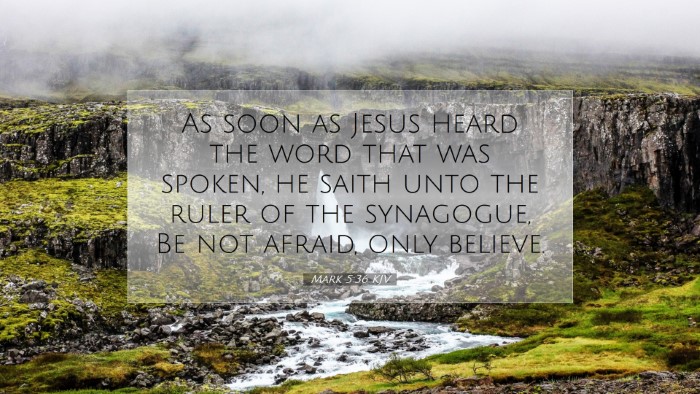Commentary on Mark 5:36
Bible Verse: “As soon as Jesus heard the word that was spoken, he saith unto the ruler of the synagogue, Be not afraid, only believe.”
Introduction
Mark 5:36 occurs in a context of desperation and faith. The ruler of the synagogue, Jairus, approaches Jesus in a state of urgency, seeking healing for his dying daughter. This verse captures Jesus' intimate response to Jairus, emphasizing the theological nuances of fear and belief in the face of dire circumstances. Throughout biblical literature, such moments reveal profound insights about the nature of God and His calls to trust amidst trials.
Exegesis of Mark 5:36
In this passage, the word “immediately” marks a significant transition. It indicates that Jesus is responsive to the needs presented to Him. The distressing news brought to Jairus—that his daughter is dead—serves as a critical moment where fear can overtake faith. Jesus counters this fear with a simple command: “Be not afraid, only believe.” This challenge is powerful, urging Jairus (and the reader) to move beyond a human perspective of despair and to embrace a divine perspective of hope.
Theological Implications
- The Nature of Faith: The imperative to “only believe” highlights the essence of faith in times of crisis. Albert Barnes emphasizes that faith is not merely a belief in facts but a trust in the character and power of God. In moments of darkness, faith becomes an anchor of assurance.
- The Role of Fear: Matthew Henry notes that fear often accompanies faith's journey. In confronting the reality of loss, faith must prevail over fear. Jesus’ call to refrain from fear is a reminder of His sovereignty and encourages a perspective that is centered on divine possibility rather than human limitation.
- Christ’s Authoritative Word: Jesus' words carry authority that silences doubt and fear. Adam Clarke points out that the power of Christ’s speech is transformative, enabling believers to rise above their circumstances. His declaration is not only a directive but also a promise of support and reassurance.
Pastoral Reflections
For pastors, this verse serves as a poignant reminder of the balance between faith and fear. In ministry, one often encounters congregants in moments of profound despair. Here, the message of Jesus becomes a model for ministry: offering comfort while urging a steadfast faith amidst challenging realities. Pastors are encouraged to guide their communities towards a deeper trust in God’s provision and timing.
As they counsel individuals facing crises—whether health issues, relational strife, or spiritual doubts—pastors can echo Christ's charge to “only believe.” This encourages congregants to reframe their situations through the lens of faith, leading them to deeper reliance on Christ’s promises.
Application for Students and Theologians
For students and theologians, Mark 5:36 provides fertile ground for exploring the interplay between faith, fear, and the authority of Christ. Engaging with the historical and cultural backdrop of synagogue leaders like Jairus can yield insights into the societal expectations of faith during biblical times. This encourages deeper scholarly engagement with themes of leadership, crisis, and faithfulness.
Moreover, exploring commentaries such as those by Clarke, Henry, and Barnes encourages students to examine the hermeneutical methods of biblical exegesis, integrating various interpretive strategies and discovering applications for contemporary faith communities.
Conclusion
Ultimately, Mark 5:36 is a profound reminder of Jesus’ compassionate call to faith amidst fear. It invites believers to bring their fears before Him while firmly anchoring their trust in His divine authority and ability to transform desperate situations into testimonies of faith. As this passage resonates through the ages, it continues to challenge, comfort, and encourage the faithful to “only believe.”


